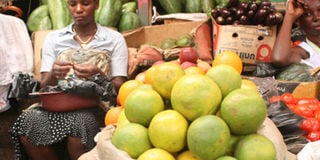Prime
Uganda’s fruit juice consumption on the rise as dominant player battles for market

A woman sells fruits in Nakasero Market. A senior official from the statistics and planning department of the Agriculture Ministry says there is no data on Uganda’s fruit production. Photo by Faiswal Kasirye.
What you need to know:
According to the 2011 Ministry of Agriculture statistical abstract, 2,904 tonnes of fruits were exported in 2010, down from the 7,821 tonnes that were exported in 2006. This trend continued into 2011, with a reported 1442 tonnes of fruits exported in the year.
A fast growing middle class and a more health conscious population is spearheading the increased consumption of fruit juices.
More Ugandans are consuming fruit juice even though its price remains slightly higher compared to other soft drinks.
The lowest price for a fruit juice pack of less than 300mls is Shs1,000 compared to the Shs5,00 charged for some other soft drinks of the same quantity.
Other soft drinks; imitation drinks such as ‘Safi juice’ and carbonated soft drinks such as soda are the most popular soft drinks consumed in Uganda. This is partly explained by their prices and popularity of their brands.
But packed fruit juices have only become popular with consumers in the last decade.
Prior to that, it was rare to find people taking fruit juice as it was labeled expensive and limited to a certain section of the population. This is however changing, as more people embrace packed fruit juices.
Even though there are hardly any statistics to quantify this trend, the growing investors’ interest in the sub-sector confirms the growth in consumption.
Information obtained from Uganda National Bureau of Standards (UNBS) by mid-last week, indicates that there are at least seven certified and large scale fruit juices/drinks producing companies, compared to the less than five companies that were operating at the end of 2010.
Altogether, there are 52 certified soft drinks products manufactured by less than 15 companies in the country.
Uganda is one of the biggest fresh fruit producers on the continent. However, a huge percentage of these fruits have been exported at low garden prices while some are locally consumed and others rot in the gardens.
This trend has been attributed to few fruit juice producers in the country.
Growth in competition
Although processing is still considered low due to limited extraction of juice and packing, the positive strides witnessed in the last two years signal improvement as both juice production and farmers’ involvement has grown.
By the end of 2010, there were a few fruit juice producers and the market was dominated by House of Dawda (Britannia Allied Industries Limited) juice products— Splash and Yojus.
However, in 2011, two big companies; Sameer Agriculture Livestock Ltd (SALL) and Coca Cola joined the local market, each launching a multi-billion fruit juice plant.
Sameer announced that it had invested Shs5.2 billion in a juice plant and would use locally grown fruits to produce a variety of high quality juices under the brand Diama juice.
On the other hand, Century Bottling Company (CBC), manufacturers of Coca Cola products introduced Minute Maid juice brand after investing about Shs39 billion ($15 million) in a juice processing line at its Namanve plant.
According to Mr Norton Kingwill, the CBC country manager, Minute maid was introduced as a result of a steady growth in fruit juice consumption and the need to widen the variety of soft drinks.
“Coca Cola has been manufacturing Minute Maid in other countries. Last year, we started producing it here. Our research shows that more people are consuming both juice and sodas.
Being the leader in the soft drinks industry, we decided to launch juice production also,” he said in an interview with Prosper.
He added that within a year, the demand for this juice has grown and the company aims to produce more and introduce other fruit juices apart from mango juice in future.”
In an email, Mr Dan Jakana, a director with Jakana Foods Inc, noted that today, more people prefer fruit juices to other soft drinks as the latter are recommended by medical experts for their composition of natural and healthier ingredients.
“Yes, this is growing as more health conscious people join the middle-income class who are health conscious. Ugandans are beginning to appreciate juices from our own grown fruits that have a natural taste. I am confident this trend will continue,” Mr Jakana said.
Mr Jakana, however, noted that while the market continues to appreciate fruit juices, the manufacturers continue to face high costs that keep the prices of fruit juices relatively high compared to other soft drinks.
“The government imposes a steep import duty tax on long life packaging materials. To avoid this, one has to literally process packaging materials locally. The cost of capital is also steep. Fruits are seasonal but if the cost of capital was reasonable we could store fruit juice in off season.”
Fruit exports drop
As a result of the growing local juice fruit production, the volumes of fruits exported has significantly dropped in the past seven years.
According to the 2011 Ministry of Agriculture statistical abstract, 2,904 tonnes of fruits were exported in 2010, down from the 7,821 tonnes that were exported in 2006. This trend continued into 2011, with a reported 1442 tonnes of fruits exported in the year.
No official data
However, a senior official from the statistics and planning department of the agriculture ministry says there is no data on Uganda’s fruit production.
“We don’t have information on fruits production. We have not carried out a fruits census for such a long time. Fruits exports statistics are available because they are tallied whenever they reach the border or airport.”
The agriculture ministry is convinced that the increasing home processing is the best and direct way to motivate local farmers to grow more fruits.
“We are promoting adding value to agriculture products. It is good that more fruits are being processed locally. Minus creating a bigger market for the fruits, more jobs are created locally. As government, we are committed to ensuring a favourable environment that will enable higher local production,” Mr Mujumbi, the state minister for Agriculture, told Prosper in an interview.
Due to the increasing demand for fruit juices, processing plants are directly spending on farmers to ensure stable supply of the raw fruits.
For example, Britannia Allied Industries (House of Dawda) is distributing fruit seedlings to farmers, with more than 20,000 already given out. Under this, the benefiting farmers agree to grow and supply fruits to the seeds distributor at an agreed price.
Additionally, since the launch of Minute Maid juice last year, CBC has been working with farmers in the districts of Soroti and Pallisa, providing them with better techniques of mango farming, good seeds and a market for their fruits.




